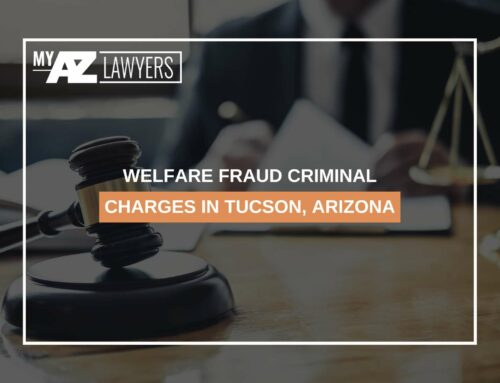An AZ Defense Lawyer’s Evaluation Of Felonies Vs. Misdemeanors
The Difference Between a Felony & a Misdemeanor Charge In Arizona
When you are charged with a crime, you may be overwhelmed as you start to understand all of the consequences and implications for your life. In order to properly understand both the immediate and long term consequences you may be facing, you’ll first need to understand how the crime has been categorized. Arizona law divides criminal convictions into three categories: infractions, misdemeanors, and felonies.
An infraction is the most minor type of criminal offense and includes violations such as speeding and tailgating. In most cases, you will only have to pay a small fine. You probably won’t even need to appear in court and it’s likely that the violation won’t appear on your criminal record. Misdemeanors and felonies are more serious convictions that will end up on your criminal record and result in more severe punishments.
It’s imperative that you work with a Tucson criminal defense attorney as soon as you find out that you are facing charges. Your attorney will defend your case and work to protect your rights. Here is what you need to know about the differences between misdemeanor and felony charges.

The Basics Of Misdemeanor & Felony Convictions
In Arizona, misdemeanors are divided into three classes depending on the severity.
- Class 1 misdemeanors include crimes such as DUI (driving under the influence), assault, disorderly conduct, possession of drug paraphernalia, shoplifting, resisting arrest, and more.
- Class 2 misdemeanors include crimes such as reckless driving, leaving the scene of an accident, and criminal damage under $250.
- Class 3 misdemeanors include crimes such as excessive speeding, leaving the scene of a parked car accident, assault, and some types of criminal trespass.
Similarly, felonies are also classified into different categories, ranging from Class 1, which are the most severe, to Class 6, which are the least severe. With a good defense lawyer, a Class 6 felony can be reduced to a misdemeanor. Examples of felonies in Arizona include homicide of varying degrees, manslaughter, aggravated assault, aggravated robbery, burglary, and more. Felony DUI charges include DUIs with a suspended license or minor in the vehicle, 3 or more DUIs in 7 years, driving the wrong way on the highway while under the influence, and more.
Jail Or Prison Time
People who have been convicted of a misdemeanor or felony will almost certainly be sentenced to some amount of time in jail or prison. If the misdemeanor is minor and you have a clean background, it’s possible that the judge will waive your jail time.
How much time you are sentenced to depends on what class of misdemeanor or felony you are convicted of as well as the circumstances of the crime.
- Class 1 misdemeanor: 6-12 months
- Class 2 misdemeanor: 30-60 days
- Class 3 misdemeanor: 30 days or less
- Class 1 felony: death penalty or life sentence in prison
- Class 2 felony: 25 years or more
- Class 3 felony: 10-25 years
- Class 4 felony: 5-10 years
- Class 5 felony: 1-5 years
Fines
You can expect to pay more in fines if you are charged with a felony. But people who are charged with a misdemeanor are often sentenced to pay fines as well. Usually, the more severe the charges, the higher the fine will end up being. Once your sentencing is complete, even if you have been able to avoid jail time after conviction, you probably will still have to pay a fine. You can also expect to pay court costs, which can be very expensive.
Other Penalties
A variety of other penalties may be sentenced, depending upon the crime for which you are convicted, the circumstances, any other criminal background you may have, and the severity of the crime. Just like with jail or prison time and fine, you can expect your consequences to be more severe for a felony and less severe for a misdemeanor. However, there will still be uncomfortable consequences regardless of the crime.
Any criminal conviction that is on your record, whether it’s a misdemeanor or a felony, can make it difficult for you to get a job or to become approved as a volunteer for any organization, and can even complicate the process of finding housing. In other situations, you may be denied a scholarship, lose your professional licensure, and lose other benefits. People who are convicted of a felony will also lose their right to vote and to own a firearm.
Contact An Experienced Criminal Defense Attorney In Arizona
The consequences of a criminal conviction will follow you for years, even after you have paid your fines or finished your jail time. If you’ve been charged with a crime, consult with a Mesa criminal defense lawyer as soon as possible so you can explore your options. A good attorney will fight the charges against you by conducting an investigation of their own, preparing a defense, and working to eliminate or reduce the conviction and punishment. Avoiding conviction or getting a reduced sentence will help you move forward in life more quickly.
This article is courtesy of Villanueva Skura Attorneys at Law, a renowned criminal defense firm based in Mesa, AZ, who protects the interest of their clients through experienced and thorough representation.
Arizona Offices:
Mesa Location:
1731 West Baseline Rd., Suite #100
Mesa, AZ 85202
Office: (480) 448-9800
Email: info@myazlawyers.com
Website: https://myazlawyers.com/
Phoenix Location:
343 West Roosevelt, Suite #100
Phoenix, AZ 85003
Office: (602) 609-7000
Glendale Location:
20325 N 51st Avenue Suite #134, Building 5
Glendale, AZ 85308
Office: (602) 509-0955
Tucson Location:
2 East Congress St., Suite #900-6A
Tucson, AZ 85701
Office: (520) 441-1450
Avondale Location:
12725 W. Indian School Rd., Ste E, #101
Avondale, AZ 85392
Office: (623) 469-6603














